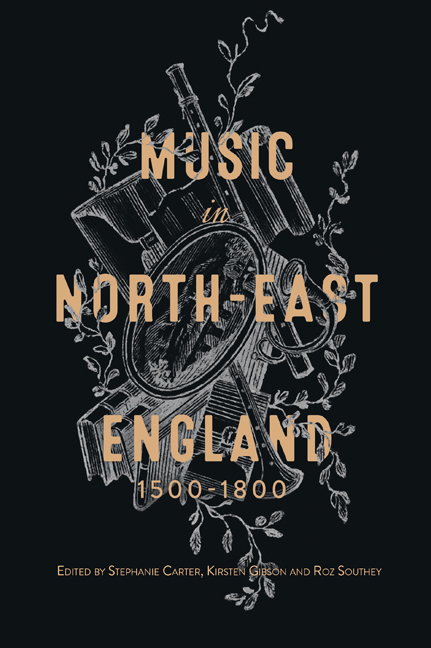1 - ‘All Mynstralles betwene the Ryvers of Trent & Twede … yerely resorte vnto this towne and Borough of Beverley’: Examining the Evidence for Beverley as the Late Medieval and Early Modern Centre for Professional Musicians in the North-East
Published online by Cambridge University Press: 17 November 2020
Summary
Musical activity in the North-East of England in the late medieval and early modern periods is attested by a wealth of surviving documents. Those of York and Newcastle upon Tyne have been published, along with the surviving documentary evidence for drama, dance and other kinds of performance, in the Records of Early English Drama (REED) series. Research on the rest of the North-East region is well underway in the Durham-based project REED North-East. Evidence collected so far for the north-eastern region shows minstrels attached to great households and on tour, as well as bands of waits employed over many years in numerous towns and cities. However, although many other craftspeople in those centres formed occupational guilds from the fourteenth or fifteenth centuries, evidence of guilds of minstrels or musicians is harder to find. This chapter examines the documentary evidence for one guild of minstrels, that of Beverley in the East Riding of Yorkshire, with the aim of discovering more about its significance in the wider contexts of urban and musical life in the period.
I shall focus in detail on the 1555 Ordinances of the Minstrels’ Guild of Beverley, particularly their claims for the antiquity and status of the guild, before discussing wider contexts: Tudor Poor Law statutes governing vagabondage, which threatened touring minstrels; the recorded activities of minstrels in Beverley, including the long-established town waits; documentary and sculptural evidence supporting the claim for Beverley as a northern musical centre; and finally the possibility that Beverley was at one time the headquarters of a northern minstrels’ court.
❧ The 1555 Ordinances: Documentary Context
The quotation in the title of this chapter comes from the only surviving copy of the ordinances of the Beverley Guild of Minstrels. This 1555 document can be assumed to be a correct copy; it was carefully recorded by the town governors (Beverley's equivalent of a mayor and council at that period) in their formal book of record, now known as the Great Guild Book from the number of guild ordinances entered in it.
A significant aspect of these ordinances is that no others for the Minstrels’ Guild survive among the extensive town records. The surviving documents, apart from the Great Guild Book, include accounts, minute books of the governors and later mayors, and a fifteenth-century document called the Town Char-tulary (which also records many local guilds’ ordinances).
- Type
- Chapter
- Information
- Music in North-East England, 1500–1800 , pp. 13 - 28Publisher: Boydell & BrewerPrint publication year: 2020



